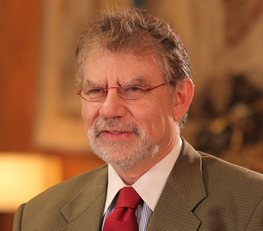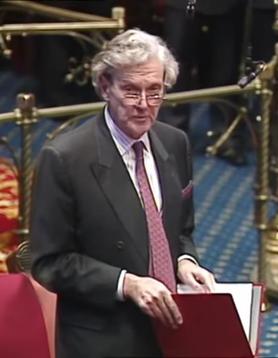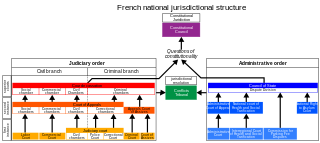External links
- Dentons Archived 2 February 2021 at the Wayback Machine
- University College London
- College of Europe
- Durham European Law Institute
David O'Keeffe is an Irish lawyer. He is emeritus Professor of European Law at University College London, Senior Counsel of Dentons international law firm and a part-time European administrative law judge. [1]
As a practitioner, he specialized in EU and WTO Trade law, State aid, antitrust, and energy law. He litigated before the European General Court and the European Court of Justice, principally in trade cases. [1] Most of his cases concerned anti-dumping including the Rusal Armenal case on market economy treatment [2] and the RFA appeal on the relationship between EU anti-dumping law and WTO law. [3] He argued sanctions cases before the European Courts including the Dinamo Minsk litigation concerning EU sanctions against Belarus, [4] and the cases OAO Minskii Avtomobilnyi Zavod [5] and Belaz-upravljajusaja kompanija holdinga Belaz Holding v Council. [6] He pleaded a number of competition cases including the Mediaset case on repayment of illegal State aid. [7] He occasionally litigated in other areas such as the Eurojust case, pertinent for standing issues. [8] [9] He acts as an arbitrator in commercial disputes concerning the application of EU law.
From 2008 O'Keeffe was a judge of the Tribunal of the European University Institute. [10] [11] He was previously a Member for 6 years of the conciliation board of the European Space Agency. [12]
He was Professor of European Law at University College London (1993–2004) and Vice-Dean of the Faculty of Laws [12] at a time when UCL had a number of European law scholars, including the eminent competition law expert Professor Valentine Korah, one of the founders of modern competition law and the first woman in the world to hold a chair devoted to this subject, Margot Horspool, Basil Markesinis and Nicholas Emiliou.[ citation needed ]
He was Allen & Overy Professor of European Law and head of the Department of Law, University of Durham 1990–1993. [12] He was a professor at the College of Europe in Bruges 1993–2006. [13] He was a visiting professor at numerous Universities including University College Dublin, [12] and the University of Siena. He was law clerk to Judge T.F. O'Higgins at the European Court of Justice 1985–1990. He was a lecturer in EU and public international law at Leiden University under Professor Henry G. Schermers 1980–1984. [12]
He wrote on several areas of EU law, [13] including his published General Course on European Community Law at the Academy of European Law, titled "The Individual and European Law", European University Institute, [14] and on the free movement of labor in the EU,. [13] Amongst the works with which he is most associated are “Mixed Agreements” (with Professor Henry G. Schermers), Kluwer, Legal Issues of the Maastricht Treaty (Chancery Law Publishing, 1994) and Legal Issues of the Amsterdam Treaty (Hart, 1999). [12] He was co-founding joint editor of the European Foreign Affairs Review. [15] and an editor of the Common Market Law Review 1985–2005. [1]
He gave evidence on EU law to committees of the European Parliament, to the House of Lords and to the House of Commons. He advised the Government of The Netherlands on certain aspects of the Maastricht Treaty during the Netherlands Presidency of the EU. [1]
He was a member of the High Level Panel on the Free Movement of Workers established by the European Commission, chaired by Simone Veil. [16] [17] [18] [19]
From 1990, in connection with the Enlargement of the European Union, particularly the accession of Central and Eastern European countries, he lectured on EU law and the legal consequences of EU accession on national law at universities and groups of civil servants, judges and legal practitioners particularly in Poland, Romania, Slovenia, Slovakia. [1]
He was born in Ennis County Clare. [1] He was educated at Clongowes Wood College, University College Dublin and Yale Law School.

The European Union (EU) is a supranational political and economic union of 27 member states that are located primarily in Europe. The Union has a total area of 4,233,255 km2 (1,634,469 sq mi) and an estimated total population of over 449 million. The EU has often been described as a sui generis political entity combining the characteristics of both a federation and a confederation.

The European Economic Community (EEC) was a regional organisation created by the Treaty of Rome of 1957, aiming to foster economic integration among its member states. It was subsequently renamed the European Community (EC) upon becoming integrated into the first pillar of the newly formed European Union (EU) in 1993. In the popular language, the singular European Community was sometimes inaccurately used in the wider sense of the plural European Communities, in spite of the latter designation covering all the three constituent entities of the first pillar. The EEC was also known as the European Common Market (ECM) in the English-speaking countries, and sometimes referred to as the European Community even before it was officially renamed as such in 1993. In 2009, the EC formally ceased to exist and its institutions were directly absorbed by the EU. This made the Union the formal successor institution of the Community.

The European Court of Justice (ECJ), formally just the Court of Justice, is the supreme court of the European Union in matters of European Union law. As a part of the Court of Justice of the European Union, it is tasked with interpreting EU law and ensuring its uniform application across all EU member states under Article 263 of the Treaty of the Functioning of the European Union (TFEU).
In international law, the Berne three-step test is a clause that is included in several international treaties on intellectual property. Signatories of those treaties agree to standardize possible limitations and exceptions to exclusive rights under their respective national copyright laws.
In international economic relations and international politics, most favoured nation (MFN) is a status or level of treatment accorded by one state to another in international trade. The term means the country which is the recipient of this treatment must nominally receive equal trade advantages as the "most favoured nation" by the country granting such treatment. In effect, a country that has been accorded MFN status may not be treated less advantageously than any other country with MFN status by the promising country.
Subsidiarity is a principle of social organization that holds that social and political issues should be dealt with at the most immediate or local level that is consistent with their resolution. The Oxford English Dictionary defines subsidiarity as "the principle that a central authority should have a subsidiary function, performing only those tasks which cannot be performed at a more local level". The concept is applicable in the fields of government, political science, neuropsychology, cybernetics, management and in military command. The OED adds that the term "subsidiarity" in English follows the early German usage of "Subsidiarität". More distantly, it is derived from the Latin verb subsidio, and the related noun subsidium.

Paul Demaret is a university professor and former rector of the College of Europe, located in Bruges (Belgium) and Natolin (Poland).

European Union citizenship is afforded to all nationals of member states of the European Union (EU). It was formally created with the adoption of the 1992 Maastricht Treaty, at the same time as the creation of the EU. EU citizenship is additional to, as it does not replace, national citizenship. It affords EU citizens with rights, freedoms and legal protections available under EU law.
Judicial activism is a judicial philosophy holding that courts can and should go beyond the applicable law to consider broader societal implications of their decisions. It is sometimes used as an antonym of judicial restraint. The term usually implies that judges make rulings based on their own views rather than on precedent. The definition of judicial activism and the specific decisions that are activist are controversial political issues. The question of judicial activism is closely related to judicial interpretation, statutory interpretation, and separation of powers.

The European single market, also known as the European internal market or the European common market, is the single market comprising mainly the 27 member states of the European Union (EU). With certain exceptions, it also comprises Iceland, Liechtenstein, Norway, and Switzerland. The single market seeks to guarantee the free movement of goods, capital, services, and people, known collectively as the "four freedoms". This is achieved through common rules and standards that all participating states are legally committed to follow.

Joseph Halevi Horowitz Weiler is an American academic, currently serving as European Union Jean Monnet Chair at New York University School of Law and Senior Fellow of the Minda de Gunzburg Center for European Studies, Harvard.

Gordon Slynn, Baron Slynn of Hadley was a British judge and Advocate General of the European Court of Justice. He particularly specialised in European law. He was a Lord of Appeal in Ordinary.

French law has a dual jurisdictional system comprising private law, also known as judicial law, and public law.
The Legal Service of the European Commission is the in-house legal counsel to the commission, located in Brussels. It ensures that Commission decisions comply with EU law, preventing or reducing the risk of subsequent litigation. It provides legal advice to the commission and its departments, and represents the Commission in court cases.
Jonathan Branton is an English lawyer. He is Head of EU/Competition at the English law firm DWF and also leads the Government & Public Sector group. He is a specialist on UK and EU Competition and EU State Aid Law. Branton is also one of the most experienced trade law lawyers in the UK, specializing in EU and WTO trade law, with extensive experience in pleading before the EU courts.

Arie Reich is an Israeli legal scholar specializing in international trade law and European Union Law. He is a full professor at the Bar-Ilan University Faculty of Law, and serves as the Vice Rector of the university. He previously served as the Dean of the Faculty of Law and Dean of students.

European Court of Justice (ECJ)

R (Miller) v Secretary of State for Exiting the European Union is a United Kingdom constitutional law case decided by the United Kingdom Supreme Court on 24 January 2017, which ruled that the British Government might not initiate withdrawal from the European Union by formal notification to the Council of the European Union as prescribed by Article 50 of the Treaty on European Union without an Act of Parliament giving the government Parliament's permission to do so. Two days later, the government responded by bringing to Parliament the European Union Act 2017 for first reading in the House of Commons on 26 January 2017. The case is informally referred to as "the Miller case" or "Miller I".
Peter van den Bossche is a professor of international economic law at the University of Bern. In 2018 he was elected president of the Society of International Economic Law (SIEL). He served as a judge on the Appellate Body of the World Trade Organization (WTO) from 2009-2017, following nomination by the European Union and appointment and re-appointment by the Member states of the World Trade Organization. In December 2013 his appointment was renewed. With the end of his formal appointment at the end of 2017, US-driven delays in appointing his replacement alongside US blocking of other key WTO vacancies has meant a growing crisis for the WTO-based multilateral trading system. The election of van den Bossche as SIEL president is considered by some a sign of both defiance to economic nationalism and support for the rules-based multilateral system.

National Identity Clause is a legal principle enshrined in article 4(2) of the Treaty on European Union. Its original purpose can be linked to the protection of cultural identity, apparently threatened by the free movement of services and goods in the cultural domain. It was supposed to prevent EU competence creep in the areas belonging to complementary competencies. Today it is most typically associated with limits to European integration and protection of core competences of the nation states within the EU.